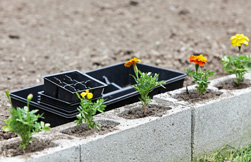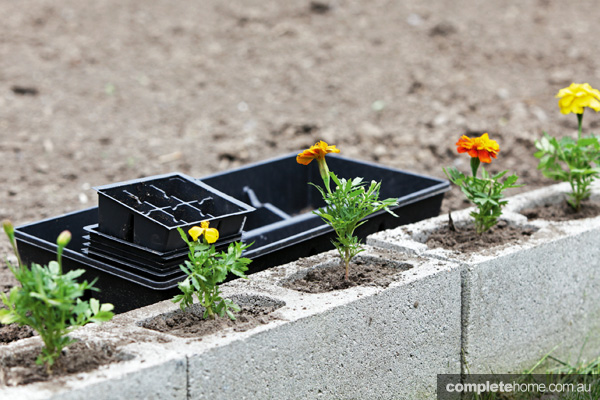Clever ideas for your garden
This cleaning solution gets top marks
The porous nature of clay pots allows deposits of calcium, minerals and salts to become trapped, resulting in whitish streaks or bands. To remove, create a solution using equal parts white vinegar, rubbing alcohol and water, and give your pots a good scrub-down. Finish with a soapy handwash or run through your dishwasher. Ensure your pot has completely dried out before planting anything in it.
Make your bed
By arranging upright concrete/cinder blocks (Besser blocks) in a formation, you can create a quick and easy raised garden bed. Once you’ve assembled your blocks, fill the hollow with compost and companion herbs and flowers to create neat, separate compartments and protect from pests. By raising your garden above the compacted, native soil, the roots will have an easier time growing, so you can expect higher yields that are easy to harvest.
A dose of calcium
If you’ve just made a pavlova or cooked eggs for breakfast, reserve your leftover eggshells for use in the garden. Eggshells will add a boost of calcium to your soil and help correct any acidity problems. Whole eggshells can be rinsed and then added to the compost bin, or if you grind them in a blender, you can sprinkle them directly onto the soil. Alternatively, you can make a home brew of calcium water by steeping dried eggshells in water for a couple of days and then using the strained water on your plants.
Let your garden design flow
To break up the layout of your garden, consider adding a dry creek bed for visual interest and landscape drainage. To create, excavate a few inches of soil in a curving, winding path, then fill with different-sized rocks and pebbles. By adding a layer of landscape fabric under the rocks, you deter weeds from popping through and spoiling the effect.
Lemon fresh
Lemons are not just for eating; they are also excellent in homemade cleaning products. Make citrus vinegar by putting rinds of 6–10 lemons — oranges are just as good — in a sterilised jar (a run through the dishwasher will do it), covering with white vinegar and leaving to infuse for two weeks. Pour the citrus-infused vinegar into a spray bottle along with an equal quantity of water and ¼ cup of salt dissolved in it for use as a general household cleaner.
Baring all this winter
Winter marks a good time in the garden calendar to take a step back and see what’s working, what’s not and make adjustments. The bareness of the garden will allow you to better examine the garden’s structure and re-evaluate the way spaces are laid out and connected.
Snap up this idea
If you have a smartphone, accompany your gardening notes with photos for additional documentation. This will refresh your memory when you refer back to them later, and provide some thoughtful details when you prepare next year’s landscape.
Make the most of winter downtime
Make the most of your winter downtime by repotting your pot plants with fresh soil and upgrading them to larger pots where necessary. It also marks a good time to inspect your garden furniture and, if necessary, organise to have it cleaned, repaired, repainted or updated with new upholstery.
Herbal household helpers
Herbs have many uses in the home and can even make a wonderful, fragrant product to clean the kitchen and bathroom. Combine half a cup of baking soda, half a cup of borax and a quarter of a cup of fresh mixed herbs that have been ground in a mortar and pestle. For a gentle clean with a fresh, natural odour, sprinkle on surfaces and rub with a damp sponge.
Don’t forget flowers
While we may always remember to buy organic fruit and vegetables, it’s important to check that your fresh flowers are also grown sustainably. Some flower farms rely on heavy pesticides that are damaging to the environment. Try to source eco-friendly flowers from the number of florists, markets and websites that are committed to creating sustainable buds.
Originally from Good Organic Gardening, Volume 6, Issue 2








